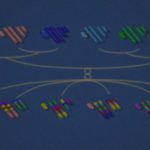Link to Pubmed [PMID] – 20639904
Link to DOI – 10.1038/onc.2010.280
Oncogene 2010 Sep; 29(38): 5265-73
Using an inter-specific subcongenic strain, Nested Recombinant Haplotype 3 (NRH3), generated between two mouse strains showing extreme differences in γ-radiation-induced thymic lymphoma susceptibility (SEG/Pas and C57BL/6J), we have identified a critical region on chromosome 19 that regulates survival of mice suffering from T-cell lymphoblastic lymphomas. Mapped on this region, the gene encoding the Cd274 ligand is able to trigger an inhibitory effect that modulates T-cell receptor (TCR) signalling and affects thymocyte maturation. Interestingly, this gene shows differential expression between thymic stromal cells from both strains in early response to a single sublethal γ-ray dose, but is inhibited in T-cell lymphoblastic lymphomas. Furthermore, we have identified several polymorphisms in the complementary DNA sequence of this gene that affect the affinity for its Cd279 receptor and are able to induce a differential rate of thymocyte apoptosis. Taken together, our data are consistent with Cd274 acting as a genetic modifier that influences the survival of γ-radiation-induced T-cell lymphoma-bearing mice. The data similarly support the idea of a co-evolution of tumour cells and associated stromal cells to generate a favourable microenvironment for T-cell lymphoma growth.

